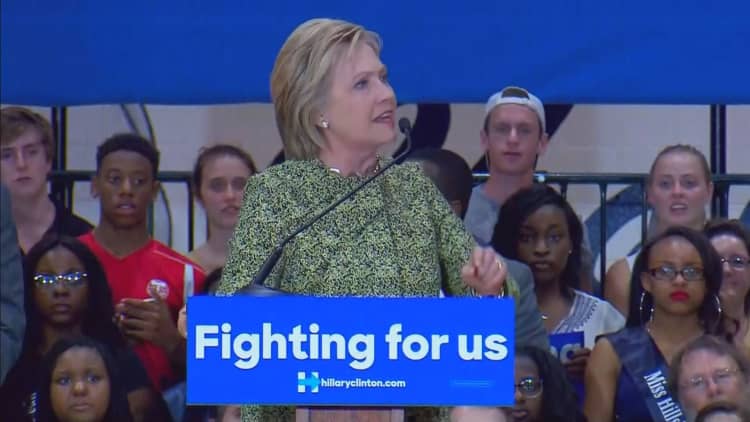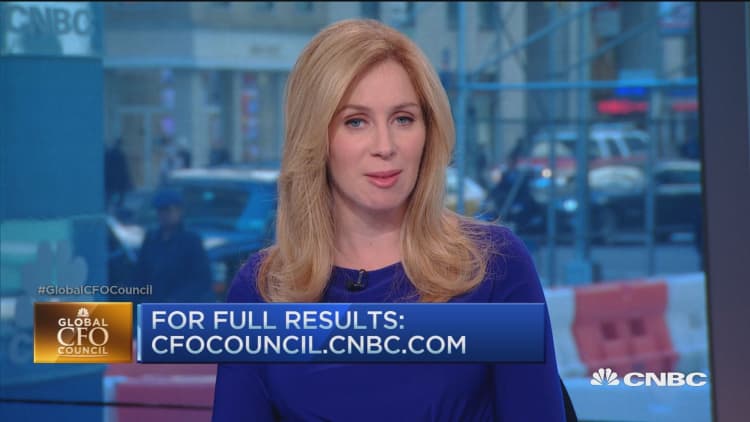
Hillary Clinton's "Medicare for More" plan certainly would cover more people — but it could also raise health-care costs for some current Obamacare customers if they aren't careful.
Nearly 13 million Americans age 50 to 64 who lack insurance or buy private health plans would be eligible to buy into an expanded Medicare program that the Democratic presidential contender has proposed, according to an analysis released Thursday.
The Avalere Health consultancy, which conducted the analysis, said those currently without health insurance in that age group — about 7 million or so people — could "potentially benefit" from Clinton's proposal.
But Avalere's report also said "it is not immediately evident that Medicare coverage would be a better option for all people over 50," as some of them would face higher costs if they moved into the new coverage option.
Avalere's analysis comes more than a week after Clinton, the Democratic front-runner, said at a campaign event that "I'm also in favor of what's called the public option, so that people can buy into Medicare at a certain age."
Clinton floated that idea that "people [age] 55 or 50 and up" could buy into Medicare, the popular federally run health-care program that as of now primarily covers Americans after they turn 65.
Her opponent in the Democratic primaries, Vermont Sen. Bernie Sanders, favors expanding Medicare to include Americans of any age in order to create a national single-payer health system.
Clinton's suggestion that Medicare be expanded to cover more people, although not as many as Sanders wants, was seen as a reaction to his continued strong support among many primary voters. (Despite that support, Clinton retains a big lead among presidential convention delegates that will be difficult for him to overcome in the remaining primary contests.)
In its analysis, Avalere noted that the 38 million or so people between age 50 and 64 who now get health coverage through an employer's plan are "unlikely to be affected by the Clinton proposal," because they would be apt to remain in those typically more generous plans. So would the approximately 10 million people in that age range who already are enrolled in government health programs like Medicare and Medicaid.
On the other hand, the 7 million uninsured people in that age range would, with expanded Medicaid, be presented with another, potentially attractive option other than Obamacare.
That leaves 5.9 million people in that age group who are insured through the individual market — buying their plans either on Obamacare health exchanges or outside of the exchanges.
Avalere said that some people who currently buy plans on Obamacare exchanges would, if they moved into the expanded Medicare program, "have higher costs and more benefit limits" than their existing health plans "because of the unusual structure of the Medicare fee-for-service program."
Medicare, for example, does not have an annual out-of-pocket health cost spending cap, as do employer-based and exchange-sold plans, Avalere noted. That could mean higher costs under Medicare than under Obamacare.
Medicare also imposes a 20 percent charge, known as co-insurance, on the total cost of things like doctor's visits, lab tests, physician-administered drugs and durable medical equipment, the company said.

Avalere also noted that Medicare Part D drug plans tend to cover the costs of fewer drugs than do so-called silver plans on Obamacare exchanges, which are the most popular kind of Obamacare plans.
But the company also pointed out that traditional Medicare tends to offer a broader network of health providers and lower deductibles than are offered by exchange plans sold to Obamacare customers who do not get their coverage subsidized by the federal government.
"Consumers would need to weigh the relative benefits of exchange products compared to Medicare, based on their particular situation," said Caroline Pearson, senior vice president at Avalere.
"Due to the unique characteristics of the Medicare program, some individuals might experience higher costs or more limited drug coverage compared to other insurance options," Pearson said.
Correction: The Avalere Health analysis was released Thursday. An earlier version misstated the day.




